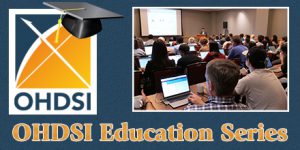Education will be a crucial tool to empower the OHDSI community to collaborate on large-scale observational health research. Throughout the month, OHDSI.org will feature various educational tools that have been developed by the community, for the community.
PREVIOUS STORIES:
OHDSI Introduction At Georgia Tech Educates Both Students And Professor
First Korea Tutorial, OHDSI Japan Formation Highlight Exciting Asian Progress Before Korea Symposium
 While OHDSI collaborators continue to seek new and innovative ways to train the growing community in the tools and best practices of the network, face-to-face tutorials remain an effective method for educating both newcomers and veterans. During the 2019 OHDSI U.S. Symposium, there were six tutorials held, and you can watch any or all of them now on the OHDSI YouTube channel.
While OHDSI collaborators continue to seek new and innovative ways to train the growing community in the tools and best practices of the network, face-to-face tutorials remain an effective method for educating both newcomers and veterans. During the 2019 OHDSI U.S. Symposium, there were six tutorials held, and you can watch any or all of them now on the OHDSI YouTube channel.
Here is a breakdown of those tutorials to make it easier.
SUNDAY TUTORIALS
OMOP Common Data Model & Standardized Vocabularies
This workshop is for data holders who want to apply OHDSI’s data standards to their own observational datasets and researchers who want to be aware of OHDSI’s data standards, so they can leverage data in OMOP CDM format for their own research purposes.
Faculty: Christian Reich, Mui Van Zandt, Hamed Abedtash, Melanie Philofsky, Don Torok, Dmytry Dymshyts
Videos/Materials: Full Tutorial
Materials: Materials on Github • Tutorial Slides
Cohort Definition/Phenotyping
This workshop is to develop better approaches for designing, implementing, evaluating, and disseminating phenotypes. The learning objectives and technical competencies are:
• Learn principles for cohort definition and evaluation
• Develop rule-based heuristics in ATLAS
• Apply cohort definitions to analytical use cases of: disease phenotyping, exposure definition, cohort characterization, effect estimation and patient-level prediction.
Faculty: Patrick Ryan, Chris Knoll, Joel Swerdel, Cong Liu
Videos/Materials: Introduction • Cohort Definition using Criteria2Query C2Q l Evaluating a phenotype using PheValuator
Materials: Overall Tutorial Slides • PheValuator Slides • Criteria2Query Slides
TUESDAY TUTORIALS
Patient-Level Prediction (PLP)
This workshop is for researchers who want to design prediction studies for precision medicine and disease interception using the OHDSI tools and programmers who want to implement and execute prediction studies using the OHDSI methods library.
Faculty: Peter Rijnbeek, Jenna Reps, Ross Williams
Videos/Materials: Introduction to predictive modeling in observational healthcare data • What is Patient-Level Prediction? • Learning the PLP Framework • TRIPOD • Running a prediction in Atlas
Materials: Materials on Github • Tutorial Slides
Population-Level Estimation
This workshop is for researchers who want to design and execute causal effect estimation studies for safety surveillance and comparative effectiveness using the OHDSI tools. The focus will be on the new-user comparative cohort design using propensity scores.
Faculty: Martijn Schuemie, Patrick Ryan, James Weaver, Alex Rekkas
Videos/Materials: Overview of the new user cohort method design • Dissecting a cohort study • Walk-through of implementing a cohort study using OHDSI tools • Collaborate on the design of a study
Materials: Materials on Github • Observational Study Design Slides • Dissecting A Cohort Design Slides
Data Quality
Participants will learn how to understand and use three freely available sets of tools that assess the quality of OMOP v5 data. A conceptual framework for data quality will be presented, followed by hands-on instruction for installing and running all three sets of tools: Achilles Heel; PEDSnet DQA Toolkit; and DQe-c, DQe-v and automated outlier detection. The class will involve running these tools against a real dataset.
Faculty: Andrew Williams; Vojtech Huser, Ajit Londhe, Hanieh Razzaghi, Connor Callahan, Tim Bergquist
Videos: Data Quality Overview • DataQuality Dashboard Tutorial • Testing Data Completeness with DQe c v2 • PEDSnet Data Quality
Materials: Introduction Slides • DataQualityDashboard Slides • Testing Data Completeness with DQe-c-v2 Slides • PEDSnet Data Quality Slides • PEDSnet DQA Tutorial Slides
Extraction, Transformation, and Load Process (ETL)
Learn about best practices and OHDSI tools developed to help with designing an extract, transform, & load process to take your database from raw observational data to the OMOP Common Data Model.
Faculty: Clair Blacketer, Erica Voss
Videos: Introduction • Data Model Vocabulary Mapping • Data Quality
Materials: Materials on Github • Tutorial Slides
